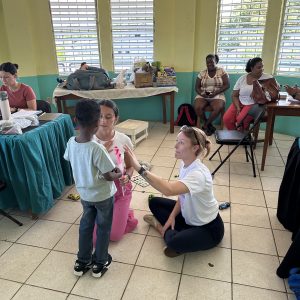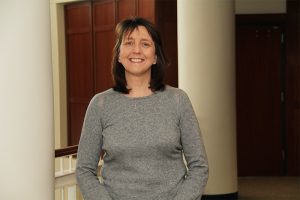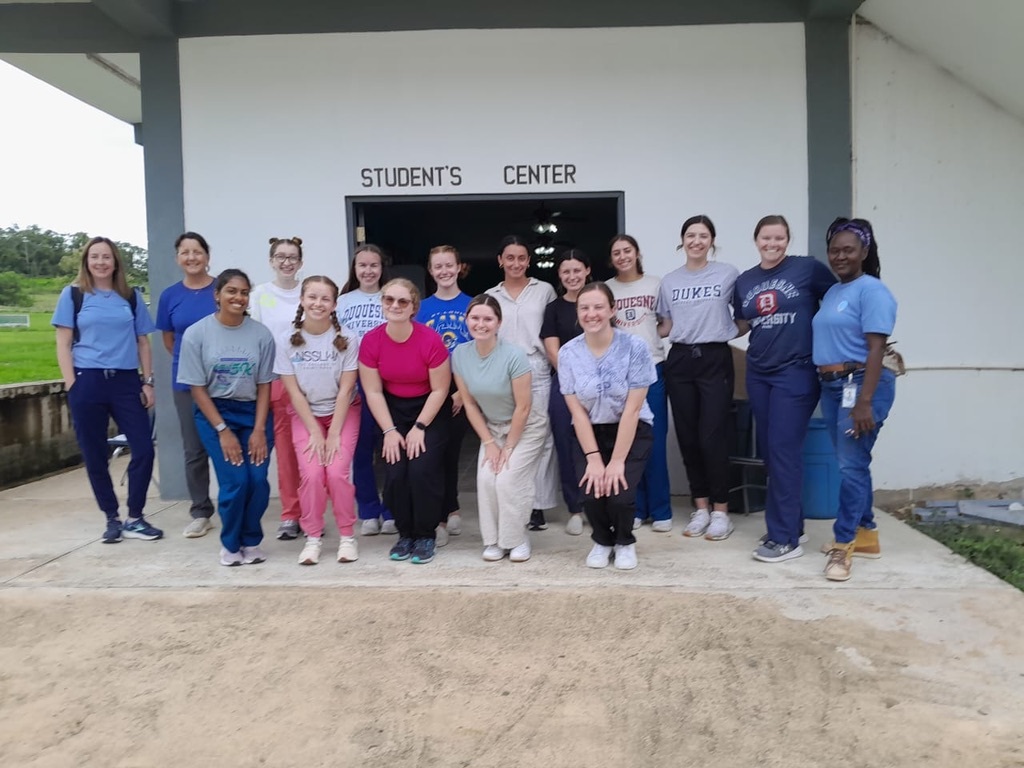Toward a brighter smile
September 12, 2023 · 2023

 Dr. Deirdre Muldoon earned her master’s from the Saint Rose communication sciences and disorders program in 1994, and joined the faculty in 2017. She has devoted her teaching, research and fieldwork to helping children with developmental disabilities meet language and feeding challenges.
Dr. Deirdre Muldoon earned her master’s from the Saint Rose communication sciences and disorders program in 1994, and joined the faculty in 2017. She has devoted her teaching, research and fieldwork to helping children with developmental disabilities meet language and feeding challenges.
Muldoon has also lent her expertise to support speech language pathologists in Africa and Central America. Last month, for the second time, she brought Saint Rose CSD students to conduct clinical work in Belize.
Here, she reflects on her background – Irish immigrant, Saint Rose alum, faculty member and parent – and the work she and her students recently did in the Caribbean nation:
How she landed in the United States and at Saint Rose:
I moved to the U.S. in August of 1988. I had been in Lake George and liked the area. I also met my husband of now 33 years. At the same time, Ireland was a mess! There was widespread political corruption and an ongoing recession causing brain-draining emigration that is a characteristic of Ireland, which is, after all, a small island.
I completed a bachelor’s in education (in Ireland.) I got a teaching job in Troy; then worked in a small Catholic agency while applying for graduate school. I was offered SLP at Saint Rose and graduated in 1994.
(While a graduate student I married and had a daughter. After graduation I gave birth to a son who, years later, also attended Saint Rose. He graduated with a master’s in business and data analytics in 2019.) Following completion of a Ph.D. in special education (University of New Mexico) I joined the Saint Rose faculty in January 2017.
Her academic interests:
I have spent my career working with children with developmental disability and autism, specializing in language and feeding disorders. Since undertaking a Ph.D., I have focused on feeding difficulties and language disorders of those on the autism spectrum. I have been privileged to complete research in both areas (thanks to the generosity of families of children with these disorders).

Evaluation day at Julien Cho High School
Her service work overseas:
For Operation Smile, a group that offers free surgery for children in developing nations with cleft lip and/or palate, I am a mentor to local speech therapists. In Ghana, earlier this summer, I supported four local speech therapists. Our task was to screen the speech of the children prior to surgery, and work with the families around feeding following surgeries.
Her recent trip with Saint Rose students:
I have a working relationship with Therapy Abroad (https://www.therapyabroad.org) a group that organizes trips for SLP. I organized the first Saint Rose trip to Belize just before Covid, in January 2020. We went to a small town not far from the Guatemalan border. Last month, (August 2023,) we went to Punta Gorda, a small town on the Caribbean that offered a chance to mix business and pleasure.
The project in Belize:
The graduate students are undertaking a clinical experience. As such, they learn about speech and language disorders in a context enormously different than where they are being trained (in Albany and environs.) They are interested in the multi-cultural experience as well as expanding their clinical knowledge.
They engaged in four very full days of clinical activities in homes, two local schools and a government education office. The families attended for assessment and treatment (For example, of children with too few words or no visible means of communication, or an adult following a stroke). The work is challenging but rewarding. There are no formal test materials. Even if they were, they are not culturally appropriate, so standard language scores would not be relevant.
The students have to think creatively and use their knowledge of language development to help guide their evaluations and interventions. They are expected to complete speech and language assessment for children, adolescents and adults and, subsequently, complete reports that reflect their assessment and intervention sessions.
Also:
Students interact with many families who do not speak English as their primary language. They often work with families with very few resources and, as such, must adjust their expectations for “homework” and follow up. One of the major travails in Belize is transportation. Families are often unable to return for therapy sessions because of rains flooding the road, or buses that break down or don’t arrive. But they want for their child what every parent wants: education, communication, independence and a chance to reach their potential.
How CSD students respond to the unfamiliar environment:
There is so much that is different between our clinics and clinics in another country. There are fewer resources of every kind in Belize: limited test materials, limited appropriate toys; limited places for testing; limited follow up of any kind.
The students are usually taken aback by the lack of resources. And though they are told what to expect, many of them have not been abroad or, if they have, it has been to places that are curated for tourists, not government offices or school rooms where they sit on the floor to assess children with communication differences. They did get a short lecture about the Belizean educational system, but the cultural differences truly emerge.
Pivotal moments of the trip:
A family of a woman who had recently had a stroke made an impact. She was 63, and had no prior SLP input. She and her family were remarkable, but clearly still working through the grief of the stroke. She was resilient and persistent and reluctant to stop working at the end of her sessions She and her family showed up every day clinics were offered. The students were amazing with her and she responded well, showing small improvements even over the four clinical days.
And, midway through the trip we had the awesome opportunity to spend an overnight on Lime Caye, a small island 35 miles off the coast of Belize. We were unable to go fishing as planned and we did a beach cleanup. The beach was covered in plastic items. What an eye opener that was. We collected 14 shoes, toothbrushes, single-use plastic bottles, styrofoam, and one motorcycle helmet! It certainly made me pause and will inform my plastic bottle use in the future.
Reponses have been edited for brevity and clarity.

